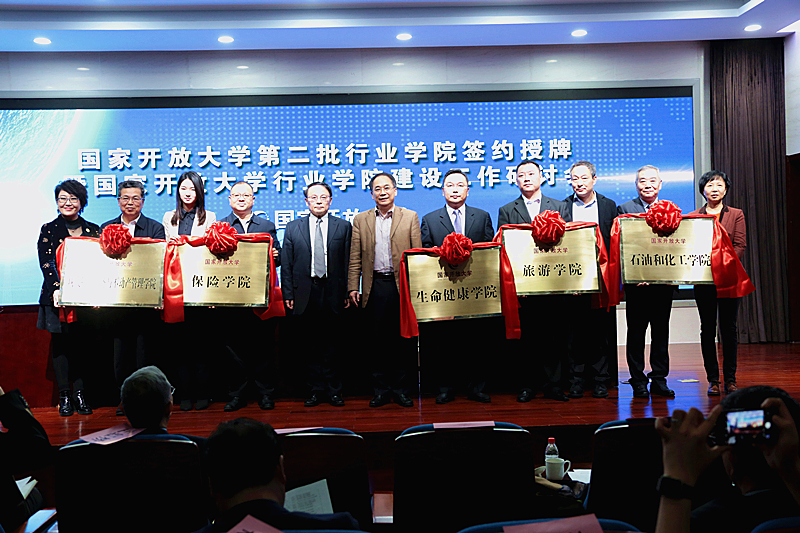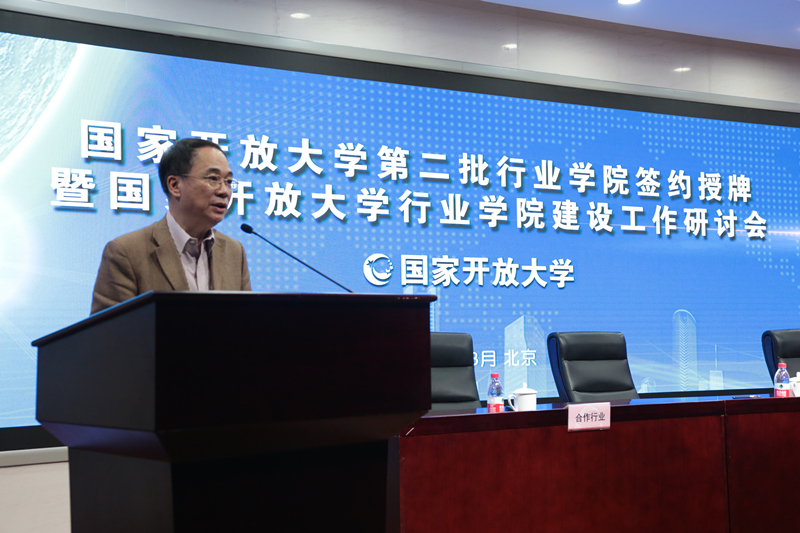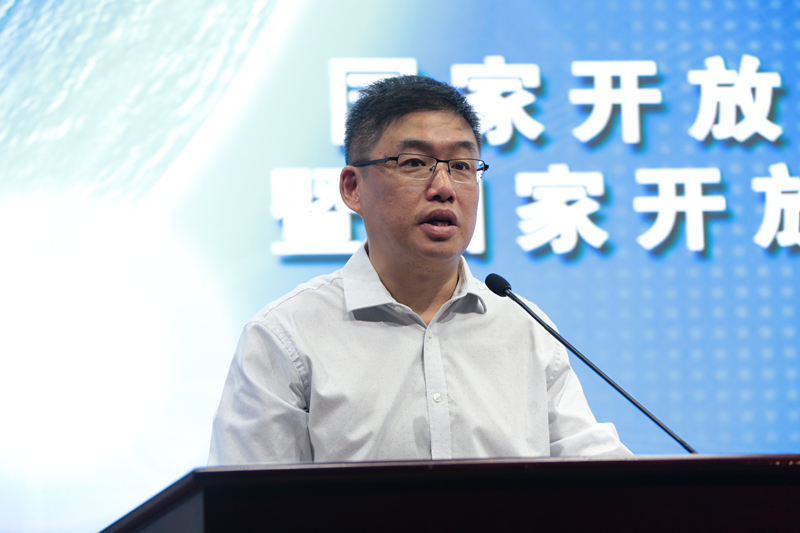 On the morning of 22 March 2019, the inauguration ceremony for the second batch of the Open University of China’s (OUC) industry and corporate colleges was held at the Wukesong Campus.
On the morning of 22 March 2019, the inauguration ceremony for the second batch of the Open University of China’s (OUC) industry and corporate colleges was held at the Wukesong Campus.

About 100 people attended the occasion, including responsible people from 22 industry ministries and commissions, 16 industry and corporate colleges, relevant OUC departments, and journalists. Yang Zhijian, secretary of the CPC OUC Committee and president of the OUC, attended the seminar, which was chaired by the OUC vice president Lin Yu, and gave a keynote speech.

During the seminar, the OUC signed official cooperation agreements with the Insurance Society of China, Changyou Information Technology Co., Ltd, the China Property Management Institute, the China Education Association of the Chemical Industry, and the China Association for the Research and Development of Traditional Chinese Medicine. It also inaugurated the second batch of industry and corporate colleges, a total of five such colleges: the School of Insurance, the School of Tourism, the School of Modern Property Services and Real Estate Management, the School of Petroleum and Chemical Engineering, and the School of Life and Heath.

Yang Zhijian, secretary of the CPC OUC Committee and president of the OUC, pointed out that the OUC has explored pilot transformation and their most important finding was to continue to include enterprises and social forces for coordinated operation of the colleges. As early as 2013, the OUC launched the explorative practice of establishing the first batch of industry and corporate colleges. Ten industry and corporate colleges, including the School of Coal and the School of Social Work, were founded in cooperation with national industry organisations such as the China Coal Industry Association and the China Social Work Federation with the support of industrial departments. In 2016, the Post School was founded in cooperation with China Post Group.
According to Yang Zhijian, the industry and corporate colleges have innovated the cultivation of applied professionals by complying with industrial development; explored a staffing model for teachers by sticking to the reality of the industry; strengthened teaching practice by bring into play the advantages of the industries; boosted quality resource construction by integrating social forces; and promoted the integration of degree and non-degree education based on the credit bank. One hundred and forty seven study centres have been set up in cooperative industries, and 14 junior college specialties and three undergraduate specialties have been offered in cooperation, serving over 24,000 active industrial and corporate students. A public service platform for continuing education has been built for industries and enterprises and quality education resources have been integrated and offered to cooperative industries and enterprises in order to train applied talents with high quality technology and skills.
Yang Zhijian expressed great confidence in the future development of the industrial and corporate colleges. He underlined that the OUC should stick to running the school in an open way and focus on substantial development in line with the requirement to “push industries and social forces to a higher level through high quality vocational education” stipulated in the Implementation Plan for National Vocational Education Reform. It should further integrate quality industrial resources in order to serve better the needs of industrial upgrading to improve the employees’ ability; further improve the organisation and management of online teaching in order to better meet the needs of on-the-job employees to learn without leaving their work; further remove systematic and institutional barriers to deepen the integration of industry and education in the field of open education; and further promote the integrated development of degree education and non-degree education to upgrade the quality of building a learning enterprise in a learning society.
During the meeting, relevant leaders from the China National Coal Association, the China Education Association of the Chemical Industry, the China Property Management Institute, and Shijiazhuang Post and Telecommunication Technical College gave keynote speeches, expressing the urgent need to promote the integration of industry and education, and their expectations for future cooperation between colleges and enterprises.

After the meeting, Yang Zhijian received an interview with the media on behalf of the OUC and answered questions related to the OUC learner development model and the construction of industrial and enterprise colleges.

On the afternoon of the same day, a seminar on the construction of OUC industry and corporate colleges was held. The participants discussed the OUC Measures on the Setup and Management of Industry and Corporate College based on secretary Yang Zhijian's speech, the special speeches, and the Implementation Plan for National Vocational Education Reform. They summarised the previous experience of the construction of the OUC industrial and corporate colleges and looked forward to their future development. All of the participants said that they will conscientiously put into effect the guiding principles of the meeting and earnestly promote the reform of the OUC’s school-running mechanism and the reform of education and teaching in industry and corporate colleges. They will further unite the social forces of industries and enterprises, tap into their respective strengths, and provide employees with better degree and non-degree education, thus providing the industries with high-quality applied professionals and boosting industrial development.
Written by Wu Yaqi and photographed by Zhuge Huanyu, OUC